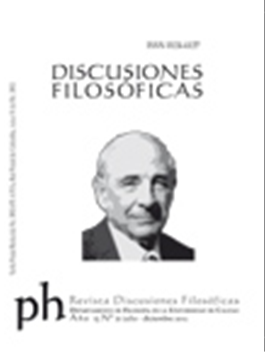Authors
Abstract
Can it be better (or worse) for me to exist than not to exist? Several philosophers have denied this, on the ground that if it could, then if I didn't exist, this would have been worse (better) for me, which is absurd. In our paper we argue that these philosophers are mistaken: Claims about the comparative value or disvalue of existence need not imply any absurdities. Such claims, which are of central importance for population ethics and for the status of the so-called Person-Affecting Restriction, can be rationalized if one adheres to the so-called fitting-attitudes analysis of value.
References
Arrhenius, G. Population axiology. Toronto: Philosophy University of Toronto, 1999. Print.
---. Future generations: A challenge for moral theory. Uppsala: University Printers, 2000. Print.
---. “The Person Affecting Restriction, comparativism, and the moral status of potential people”. Ethical Perspectives. Sep-Dec. 2003. 185-195. Print.
---. “The repugnant Conclusion”. Stanford Encyclopaedia of Philosophy, 2006. Online.
---. “Can the Person Affecting Restriction solve the problems in population ethics?” Roberts, M. and D. Wasserman (eds.). Harming future persons. Ashgate: Springer, 2009. Print.
---. Population ethics. Oxford: Oxford University Press, 2013. Print.
Arrhenius, G., Ryberg, J. and T. Tännsjö. “The repugnant conclusión”. Stanford Encyclopaedia of Philosophy, 2006. Online.
Benatar, D. Better never to have been: The harm of coming into existence. Oxford: Oxford University Press, 2006. Print.
Broome, J. Counting the costs of global warming. Cambridge: White Horse, 1992. Print.
---. Ethics out of economics. Cambridge: Cambridge University Press, 1999. Print.
---. Weighing lives. Oxford: Oxford University Press, 2004. Print.
Bykvist, K. “The benefits of coming into existence”. Philosophical Studies. Jan. 2007: 35-362. Print.
Buchanan, A., Brock D. W., Daniels N. and D. Wikler. From chance to choice: Genetics and justice. Cambridge: Cambridge University Press, 2000. Print.
Darwall, S. Welfare and rational care. Princeton: Princeton University Press, 2002. Print.
Dasgupta, P. An inquiry into well-being and destitution. Oxford: Oxford University Press, 1995. Print.
Feldman, F. “Adjusting utility for justice: A consequentialist reply to the objection from justice”. Philosophy and Phenomenological Research. Sep. 1995: 567-85. Print.
---. “Justice, desert, and the repugnant conclusion”. Utilitas. Nov. 1995: 189-206. Print.
---. Utilitarianism, hedonism, and desert: Essays in moral philosophy. Cambridge: Cambridge University Press, 1997. Print.
Freud, S. The standard edition of the complete psychological works of Sigmund Freud. London: The Hogarth Press, 1960. Print.
Glover, J. Causing death and saving lives. London: Penguin Books, 1977. Print.
Heyd, D. “Procreation and value: Can ethics deal with futurity problems?” Philosophia. Jul. 1988: 151-170. Print.
---. Genethics: Moral issues in the creation of people. Berkeley: University of California Press, 1992. Print.
Holtug, N. “In Defence of the Slogan”. W. Rabinowicz (ed.). Preference and value: Preferentialism in ethics. Lund: Lund University, 1996. Print.
---. “On the value of coming into existence”. The Journal of Ethics. Sep. 2001. 361-384. Print.
---. “Person-affecting moralities”. Ryberg, J. and T. Tännsjö (eds.). The Repugnant conclusion. Essays on population ethics. Dordrecht: Kluwer, 2004. Print.
Johansson, J. “Being and betterness”. Utilitas. Sep. 2010: 285-302. Print.
Narveson, J. “Utilitarianism and new generations”. Mind. Jan. 1967: 62-72. Print.
Moore, G. E. Principia ethica. Cambridge: Cambridge University Press, 1903. Print.
Parfit, D. Reasons and persons. Oxford: Clarendon Press, 1984. Print.
Rabinowicz, W. “The size of inequality and its badness: Some reflections around Temkin’s inequality”. Theoria. Aug. 2003: 60-84. Print.
---. “Broome and the intuition of neutrality”. Philosophical Issues. Oct. 2009: 389 - 411. Print.
---. “Values compared”. Polish Journal of Philosophy. Jan. 2009: 73-96. Print.
Rabinowicz, W. and T. Rønnow-Rasmussen. “The strike of the demon: On fitting pro-attitudes and value”. Ethics. Apr. 2004: 391-423. Print.
---. “Buck-passing and the right kind of reasons”. Philosophical Quarterly. Jan. 2006: 114-120. Print.
Roberts, M. A. Child versus Childmaker: Future persons and present duties in ethics and the Law. Lanham: Rowman and Littlefield, 1998. Print.
---. “Can it ever Be Better Never to have existed at all? Person-based consequentialism and a new repugnant conclusion”. Journal of Applied Philosophy. Oct. 2003: 159-185. Print.
Rønnow-Rasmussen, T. “Analyzing personal values”. The Journal of Ethics. Jan. 2007: 405-435. Print.
Temkin, L. S. Inequality. Oxford: Oxford University Press, 1993. Print.
---. “Harmful goods, harmless bads”. Frey, R. G. and C. W. Morris (eds.). Value, welfare, and morality. Cambridge: Cambridge University Press, 1993. Print.
Wiggins, D. Needs, values, truth: Essays in the philosophy of value. Oxford: Blackwell, 1987. Print.

 PDF (Español)
PDF (Español)
 FLIP
FLIP
























